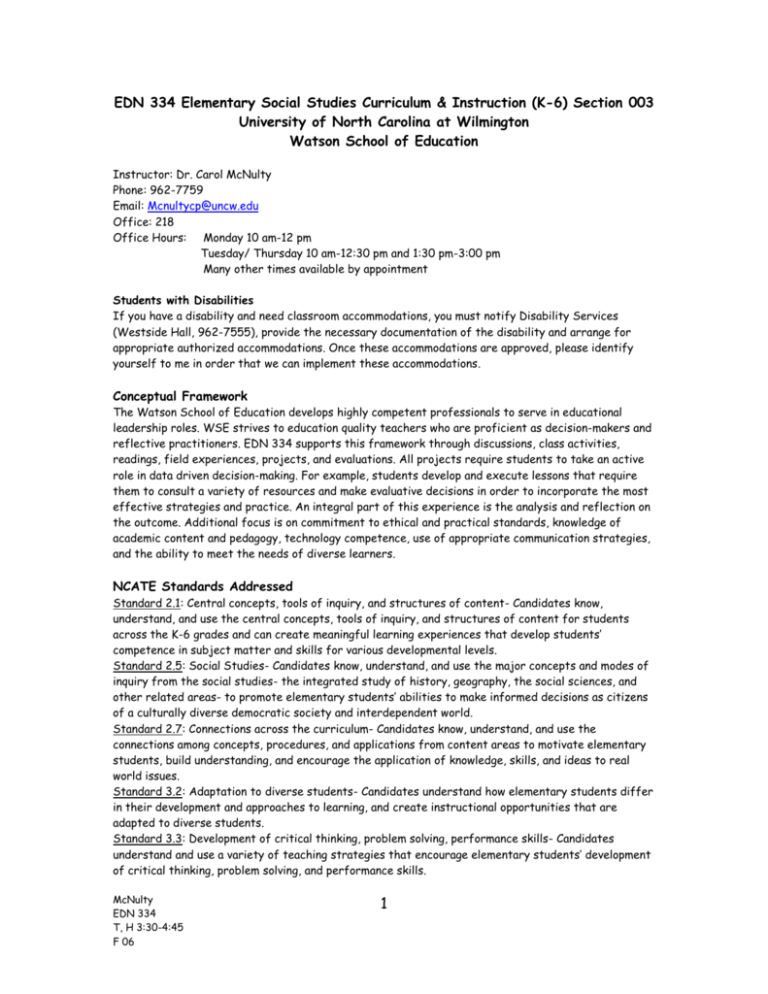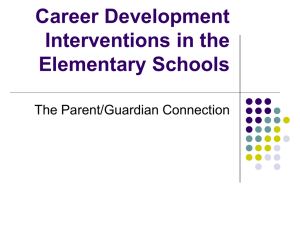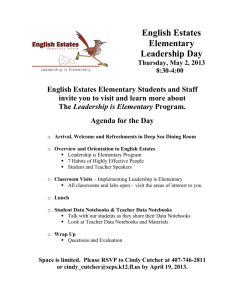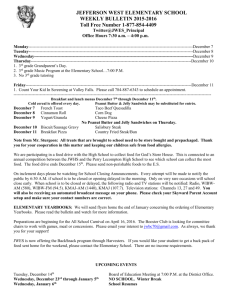EDN 334 Elementary Social Studies Curriculum and Instruction
advertisement

EDN 334 Elementary Social Studies Curriculum & Instruction (K-6) Section 003 University of North Carolina at Wilmington Watson School of Education Instructor: Dr. Carol McNulty Phone: 962-7759 Email: Mcnultycp@uncw.edu Office: 218 Office Hours: Monday 10 am-12 pm Tuesday/ Thursday 10 am-12:30 pm and 1:30 pm-3:00 pm Many other times available by appointment Students with Disabilities If you have a disability and need classroom accommodations, you must notify Disability Services (Westside Hall, 962-7555), provide the necessary documentation of the disability and arrange for appropriate authorized accommodations. Once these accommodations are approved, please identify yourself to me in order that we can implement these accommodations. Conceptual Framework The Watson School of Education develops highly competent professionals to serve in educational leadership roles. WSE strives to education quality teachers who are proficient as decision-makers and reflective practitioners. EDN 334 supports this framework through discussions, class activities, readings, field experiences, projects, and evaluations. All projects require students to take an active role in data driven decision-making. For example, students develop and execute lessons that require them to consult a variety of resources and make evaluative decisions in order to incorporate the most effective strategies and practice. An integral part of this experience is the analysis and reflection on the outcome. Additional focus is on commitment to ethical and practical standards, knowledge of academic content and pedagogy, technology competence, use of appropriate communication strategies, and the ability to meet the needs of diverse learners. NCATE Standards Addressed Standard 2.1: Central concepts, tools of inquiry, and structures of content- Candidates know, understand, and use the central concepts, tools of inquiry, and structures of content for students across the K-6 grades and can create meaningful learning experiences that develop students’ competence in subject matter and skills for various developmental levels. Standard 2.5: Social Studies- Candidates know, understand, and use the major concepts and modes of inquiry from the social studies- the integrated study of history, geography, the social sciences, and other related areas- to promote elementary students’ abilities to make informed decisions as citizens of a culturally diverse democratic society and interdependent world. Standard 2.7: Connections across the curriculum- Candidates know, understand, and use the connections among concepts, procedures, and applications from content areas to motivate elementary students, build understanding, and encourage the application of knowledge, skills, and ideas to real world issues. Standard 3.2: Adaptation to diverse students- Candidates understand how elementary students differ in their development and approaches to learning, and create instructional opportunities that are adapted to diverse students. Standard 3.3: Development of critical thinking, problem solving, performance skills- Candidates understand and use a variety of teaching strategies that encourage elementary students’ development of critical thinking, problem solving, and performance skills. McNulty EDN 334 T, H 3:30-4:45 F 06 1 Standard 3.4: Active engagement in learning- Candidates use their knowledge and understanding of individual and group motivation and behavior among students at the K-6 level to foster active engagement in learning, self-motivation, and positive social interaction and to create supportive learning environments. Standard 4:Assessment for instruction- Candidates know, understand, and use formal and informal assessment strategies to plan, evaluate, and strengthen instruction that will promote continuous intellectual, social, emotional, and physical development of each elementary student. Standard 5.2: Reflection and evaluation- Candidates are aware of and reflect on their practice in light of research on teaching and resources available for professional learning; they continually evaluate the effects of their professional decisions and actions on students, parents, and other professionals in the learning community and actively seek out opportunities to grow professionally. Standard 5.4: Collaboration with colleagues and the community- Candidates foster relationships with school colleagues and agencies in the larger community to support students’ learning and well-being. Course Description and Purpose Prerequisites: EDN 301 and 6 hours of Social Studies content. An overview of goals of social studies education and how this affects various patterns of organizing curricular content. The implications of learner developmental characteristics for selecting approaches to instruction from as well as the social and behavioral sciences will be explored. Emphasis on selection and preparation of appropriate materials including the strategies of inquiry, critical thinking, mapping and graphing, simulation and problem solution. Field experiences required. The purpose of this course is to develop an awareness of the nature and purpose for social studies education in the elementary school. Social Studies, as it is conceived in the United States, is the study of human behavior; past, present, and in some instances, future. The social science disciplines and humanities contribute to our knowledge of human behavior politically, environmentally, historically, and in a multitude of interactions. By providing students with tools that can help them interpret their behavior and the behavior of others, we will move toward making social studies something one does and uses; not merely something one knows. Methods for Social Studies is designed to provide a bridge between students’ academic work in history, geography, economics, government, sociology, and in high school and college and the demands they will face as a classroom teacher. The focus of the course is instructional design and delivery. The field experience provides the opportunity for applying the material presented. As new teachers, students will have to decide which content elements to emphasize, how to organize lessons, which instructional techniques to use, and when and how to evaluate. This course is designed to provide participants with an understanding of the tools of the social studies professional as well as to introduce practical techniques for selecting materials and strategies specific to desired learnings. (Department of Elementary, Middle Level, and Literacy Education) Course Objectives This course will introduce participants to a variety of methods and strategies for teaching social studies as well as opportunities to reflect in order to become effective decision makers selecting and implementing appropriate materials and methods through evaluation and reflection. Participants will also explore national standards and NC objectives for elementary social studies. The following course objectives will challenge participants to become problem solvers analyzing their practices. Through class discussions, projects, readings, and field experiences, participants will 1. Locate and evaluate major resources for social studies education and describe trends in the field relevant to teaching in our changing information age society. 2. Describe and demonstrate logical ways of sequencing social studies strategies to promote productive learning. McNulty EDN 334 T, H 3:30-4:45 F 06 2 3. Develop lessons, individualize materials, identify appropriate assessment strategies, and plan unit of study using the formats provided. 4. Demonstrate knowledge of basic instructional design and delivery in teaching settings. 5. Demonstrate knowledge of the content of the social studies disciplines. 6. Plan strategies to differentiate instruction to accommodate the diversity of students and learning needs found in elementary classrooms. 7. Use technology as a tool for instruction, using the Internet as a resource and as a tool for communication. a. Use web search engines and specific web addresses or bookmarks to find resources for instruction (e.g., NC Standard Course of Study for specific content area and grade level, NC Computer Skills for a specific grade, or professors’ web sites). b. Create a list of useful Internet addresses (URLs). Students will use the Internet to acquire resources for use in unit plans and lesson plans. c. Incorporate materials selected from web sites in the course, unit, and lesson designs. d. Familiarize students with key social studies specific websites and software programs for strategies and content. e. Discuss in class the social, cultural, ethical, and legal issues involved in using various types of technology and other resources and incorporate into planning to promote productive learning. f. Guide student use of software. g. Use Task Stream software to design/create lesson plans. 8. Become familiar with the national content standards in history, geography, civics, and economics and use these standards in lesson development. 9. Become familiar with the elementary social studies objectives in the North Carolina Standard Course of Study and use these objectives in lesson development. 10. Connect and integrate social studies with the broad curriculum. Resources Chapin, J. R., & Messick, R. G. (2006). Elementary Social Studies (6th ed.). New York: Longman. Copy of or access to the North Carolina State Standards (K-6). Taskstream account Additional readings may be required, but you will be given plenty of notice to acquire these materials. Course Requirements Please note that late assignments will NOT be accepted without prior approval from instructor and may result in 0 points for that assignment. All assignments are due at the beginning of class. In the event that the instructor asks you to submit a revision for an assignment, please note that all revisions will receive reduced point values to be fair to other class members. Revisions must be submitted one week after they are assigned. Please type your assignments and save them digitally, as I may ask for you to provide additional copies for various reasons (data collection, use as examples, etc.). It is YOUR responsibility to make sure this backup is available. McNulty EDN 334 T, H 3:30-4:45 F 06 3 Please check your UNCW email account frequently. Periodically I will send information via email for which you are responsible. Please make sure to STAPLE all papers. Paper-clipped or folded papers will NOT be accepted as they tend to get shuffled easily. Make sure your name appears on every page. Attach the rubric for the assignment. Additionally, please read and understand the UNCW Student Conduct Code. Email etiquette: Please note that ALL written communications will adhere to professional standards. Consider this practice for communicating with the parents of your students and administrators of your school. Grading Course Requirement Points Points Received Possible Lesson Plan Write Up 100 Field Experience Notebook 200 1- Log of dates and time spent in school 2- List of relevant resources available in school 3- Observations of lessons in field (3) 4- Reflections of lessons taught 5- Summary of what you learned Chapter “take-aways” 40 Cultural Learning Experience and Write-Up 50 Midterm Examination 50 Final Examination 60 Total 500 Pts. Received = %= Final Grade 500 Grade A AB+ B BC+ C CD F McNulty EDN 334 T, H 3:30-4:45 F 06 Equivalent Percentage 94- 100% 90-93 87-89 84-86 80-83 77-79 74-76 70-73 60-69 59 and below 4 Course Requirement Description Attendance and Participation Your promptness and active participation is expected at every class. Students can miss one class session without penalty. (This is a “freebe” save it for an emergency.) Additional missed class sessions (regardless of the reason/excuse) will result in the loss of 15 points per class from the total points earned for the semester. Chapter “Take-aways” (40 points) During the semester you will be asked to respond to the readings and class discussions by submitting the five most important things you learned, or will “take-away,” from each chapter. Give a brief overview of the concepts. Each “take-away” is worth one point. Maximum page length: 1 page per chapter Cultural Learning Experience (50 points) The cultural learning experience will give you an opportunity to briefly explore another culture and your own ideas about your ethnicity, gender, race, or socio-economic status. During this experience, you will visit a place that you would not normally go- a place in which your ethnicity, gender, race, or socio-economic standing is not readily represented. This experience should take you out of your comfort zone! You may consider going to a grocery store with a recipe, a friend’s home, a worship service, etc. After the experience, you will complete a short write-up of your impressions and reflections. You will write about an experience during this semester, even if you have found yourself in similar situations in the past. Please note that you need to plan ahead in order to find a suitable destination—don’t wait until the last minute to plan your outing! Maximum page length: 3 pages Integrated Lesson Plan (100 points) As a way to demonstrate your effectiveness in developing social studies lessons, you will develop an integrated instructional plan and submit it for my review via taskstream. It will follow the 6-point lesson plan and will be graded by a rubric. Field Experience Notebook (200 points) The field experience notebook consists of 5 parts: 1- Log of dates and time spent in school 2- List of relevant resources available in school 3- Observations of lessons in field (3) 4- Reflections of lessons taught 5- Summary of what you learned McNulty EDN 334 T, H 3:30-4:45 F 06 5 Midterm Examination (50 points) At the midpoint in the semester, you will have the opportunity to demonstrate what you have learned! The midterm will consist of multiple choice, matching, true/false, and short answer questions. Final Examination (60 points) At the end of the semester, you will have the opportunity to demonstrate all that you have learned! You will take a final exam that synthesizes all of the information from the course. The final will emphasize the last half of the semester, but will also include material from the first half. Tentative Schedule Please read BEFORE coming to class so that you will be prepared for the discussion. Date Th., Aug. 24 Tues., Aug. 29 Th., Aug. 31 Tues., Sept. 5 Th., Sept. 7 Tues., Sept. 12 Concepts Addressed Meet and Greet- Mapping Activity Review class syllabus Introduction, Overview What is Social Studies? Our memories of Social Studies What do you already know about planning for SS instruction? Standard-Driven Planning and Integrative Instruction Example of integrating the Social Studies with other content areas. Why use an integrative approach? Activity- “Whole world in my hands” Long term and short term planning-Units and lesson plans Thematic webbing as a way to brainstorm Instructional Strategies in Social Studies Education Active, Discovery, Cooperative/ Collaborative, Inquiry learning Role playing/Simulations Children as researchers Planning Integrated Lessons Brainstorming ideas- thematic webs Relating Social Studies to the larger curriculum Components of an effective lesson plan – the 6 point lesson Sample of a lesson plan Continue with lesson planning Observe integrated lesson - “The Homestead Act” Lesson plan associated with “The Homestead Act” (Covers standards in social studies, language arts, mathematics) Assessment of Student Learning Assessing standards Alternative/ Performance-based assessment Ways to assess student learning How do I know students are learning? Evidence? McNulty EDN 334 T, H 3:30-4:45 F 06 6 Assignments Due Read Ch. 2 Due: 5 “take-aways” from chapter Read Ch. 3 Due: 5 “take-aways” from chapter Th., Sept. 14 Tues., Sept. 19 Th., Sept. 21 Tues., Sept. 26 Th., Sept. 28 Tues., Oct. 3 Thurs., Oct. 5 Tues., Oct. 10 Th., Oct. 12 Tues., Oct. 17 Th., Oct. 19 Tues., Oct. 24 Analyzing Student Data Collecting and aggregating student data to direct teaching How to read student data Practice tests and small group analysis Contrasting Social Studies in Younger vs. Older Elementary Grades Curriculum integration Discussion of centers- what makes a center effective? Controversial issues Visit to the Curriculum Materials Center (Ms. Batten) Determining available resources for lessons through the Watson School of Education Secure possible topics for lesson plan Diversity/ Multiculturalism Issues and self-reflections Dr. McNulty’s teaching experiences and subsequent research Terminology White privilege Are we or aren’t we diverse?? Stereotypes and bias Activity- are we on a “level playing field”? Diversity/Multiculturalism Oprah videos and reactions Complete a quick write on reflections Diversity Sharing of cultural learning experiences Midterm Exam Fall Break Making History Come Alive! Oral Histories “Andy Griffith Show” clips to teach social studies Conducting surveys and interviews Timelines Community resources “Re-creatable” histories and “living” histories Primary Sources Primary vs. secondary sources Objects, images, audio, statistics, text, community Activity- Photo analysis guide and document analysis guide Citizenship education and democratic values Defining citizenship and activism in class, school, community Democratic issues, Global citizenship Activities- “Inside the Voting Booth”/ ”The Democracy Project” Political Science and Current Events Using student interests/What news is important news? McNulty EDN 334 T, H 3:30-4:45 F 06 7 Due before end of class: 5 “take-aways” of how you might use the resources discussed tonight Read Ch. 8 Due: 5 “take-aways” from chapter Due: Cultural learning experience paper Read Ch. 5 Due: 5 “take-aways” from chapter Read Ch. 7 Due: 5 “take-aways” from chapter Th., Nov. 16 Facts vs. opinions Activity- The Mock-Trail of Goldilocks Lesson Plan Workshop Bring your first draft of your lesson plan for your peers and me to review if needed. We will work collaboratively to offer suggestions, and provide feedback on what you’ve done. Lesson Plan Workshop- Meet in Computer Lab Continue working on integrated lesson plan Geography and Map Skills The 5 themes of geography Mental maps Reading and drawing maps Activities- Geography posters, rainforest activity, edible maps Economics Important terminology Issues of scarcity, means of production Activity- Production in assembly lines vs. “cottage industries” Linking Social Studies and Literacy Literacy as fundamental Integrated approaches Multicultural literature considerations Selected book examinations Social Studies and the Arts Research supporting arts Use of art, music, theater to teach SS Lesson sharing of integrated Social Studies strategies Tu., Nov. 21 Lesson sharing of integrated Social Studies strategies Th., Nov. 23 Thanksgiving Break Tues., Nov. 28 North Carolina Geographic Alliance Resources you will want to know about as interns and as practicing teachers Field Experience Reflections Th., Oct. 26 Tu., Oct. 31 Th., Nov. 2 Tues., Nov. 7 Th., Nov. 9 Tues., Nov. 14 Th., Nov. 30 Tues., Dec. 5 Tuesday, Dec. 12 3:00-6:00 pm Course review – Game to review content Course and instructor evaluations Final exam McNulty EDN 334 T, H 3:30-4:45 F 06 8 Bring 1st draft of lesson plan. Read Ch. 6 Due: 5 “take-aways” from chapter Integrated Lesson Plans Due on Taskstream by 3:30 pm Read Ch. 9 Due: 5 “take-aways” from chapter Due: Field Experience Notebooks





